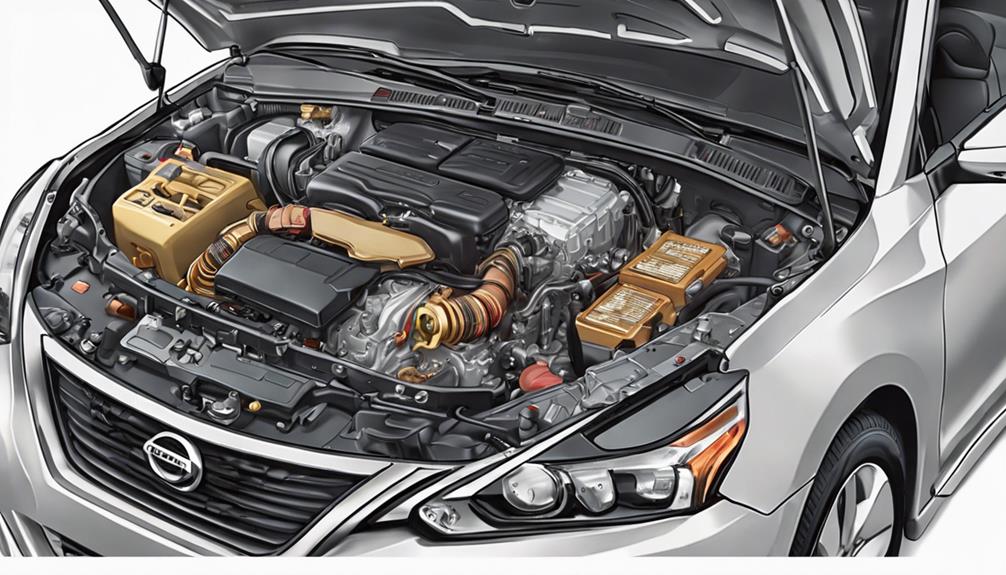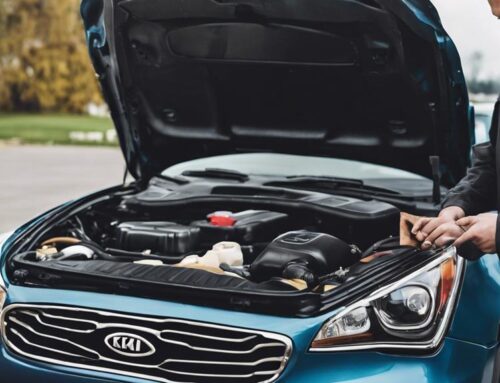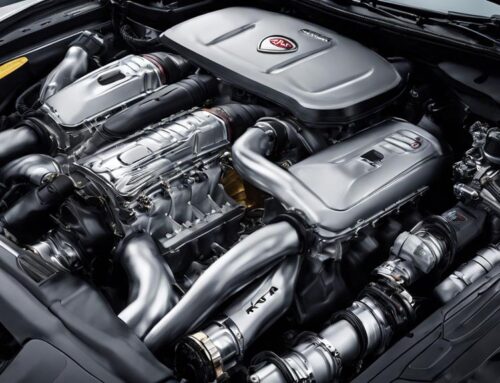You might face a few common issues with your Nissan Altima, including erratic dashboard lights and malfunctioning power windows due to electrical faults. Brake system problems like premature pad and rotor wear may cause vibrations or squeaking noises. The suspension system can result in uneven tire wear and a bumpy ride. Rough idling or transmission overheating could affect your engine's performance. Issues with the ignition key fob and failures in the security system also arise occasionally. Addressing known recalls promptly is essential for safety. By keeping up with this information, you're on the right path to maintaining your Altima effectively.
Key Takeaways
- Electrical issues: Power windows malfunction, erratic dashboard lights, and faulty sensors are common problems.
- Brake system problems: Premature wear of brake pads and rotors, causing squeaking noises or vibrations.
- Suspension challenges: Uneven tire wear and bumpy rides often result from worn shocks and struts.
- Engine and transmission concerns: Rough idling, stalling, and CVT overheating are frequent issues.
- Key system failures: Timing chain noise, intake manifold gasket leaks, and key fob synchronization problems are notable issues.
Introduction to Altima Common Issues

When diving into the common issues faced by Nissan Altima owners, it's imperative to understand that while the Altima is a reliable vehicle, it does have its share of recurring problems. To effectively address these issues, you need to be equipped with technical expertise and the right diagnostic tools. The goal is to identify problems early and apply common solutions to keep your vehicle running smoothly. For those looking to take a hands-on approach, an Ultimate DIY Maintenance Guide can be an invaluable resource.
First, let's talk about electrical system quirks that many Altima owners encounter. Problems such as malfunctioning power windows, erratic dashboard lights, and faulty sensors are frequent complaints. Utilizing diagnostic tools like an OBD-II scanner can quickly pinpoint the root cause of these issues. Once identified, common solutions include checking for blown fuses, ensuring proper wire connections, and replacing faulty sensors.
Another prevalent issue is the premature wear of brake pads and rotors. You might notice squeaking noises or vibrations when braking. To diagnose, inspect the brake pads for wear and measure rotor thickness. Common solutions involve replacing worn-out brake pads and resurfacing or replacing the rotors if they're below the recommended thickness.
Suspension problems also make the list. Symptoms such as uneven tire wear or a bumpy ride can indicate issues with the suspension system. Diagnostic tools like a tire tread depth gauge and a visual inspection of the suspension components can help you identify the problem areas. Common solutions here include replacing worn-out shocks and struts, and ensuring your wheels are properly aligned.
Engine and Transmission Problems
Electrical system quirks and suspension issues pave the way for more intricate challenges, particularly those involving the engine and transmission. You might notice your Nissan Altima exhibiting signs of reliability concerns, such as rough idling or stalling. These symptoms often point to issues with the engine's control module or fuel system. Addressing these problems swiftly can prevent more severe performance issues down the line.
One prevalent problem is the continuous variable transmission (CVT). While CVTs offer smoother acceleration and improved fuel efficiency, they can also be prone to overheating and premature wear. You may experience delayed acceleration or unusual noises, which signal the need for a transmission fluid change or potentially more extensive repairs. Keeping your transmission cool with regular maintenance is essential for longevity.
In addition, the evolution of key and security systems can contribute to the overall reliability of your vehicle.
Another common issue lies with the timing chain. If you hear a rattling noise during startup, it's a red flag that the timing chain might be stretched or damaged. Ignoring this can lead to catastrophic engine failure. Regularly checking and replacing the timing chain as recommended by the manufacturer can avert this disaster.
Moreover, the engine's intake manifold gasket can deteriorate, causing coolant leaks and overheating. This not only affects your Altima's performance but also risks severe engine damage. Inspecting the gasket for wear and tear during routine maintenance can save you from costly repairs.
Electrical and Key System Failures
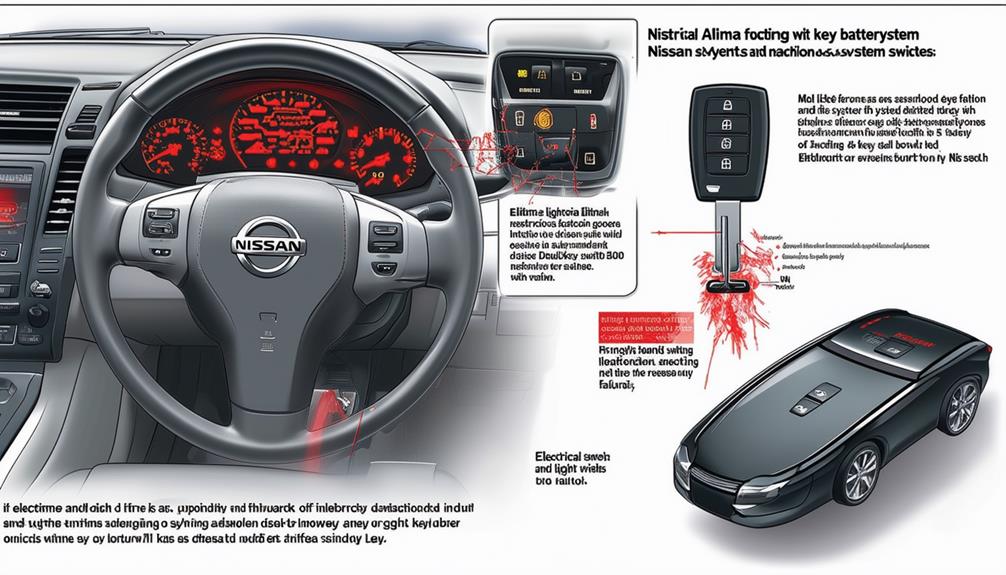
In the world of vehicular electronics, Nissan Altima owners often face electrical and key system failures that can be both puzzling and inconvenient. These issues not only disrupt your daily routine but also challenge your technical understanding. Let's explore some of the common electrical and key system problems and how to address them effectively.
Firstly, ignition failure is a common issue. You might insert your key fob, only to find the engine refusing to start. This malfunction often stems from a faulty ignition switch or a depleted key fob battery. To troubleshoot, ensure your key fob battery is fully charged. If the problem persists, the ignition switch may need professional inspection and potential replacement.
For more information on key fob technology, check out this detailed guide.
Secondly, remote start issues can also afflict your Nissan Altima. Imagine pressing the remote start button on a cold morning and nothing happens. This problem often arises from a weak key fob signal or interference from other electronic devices. To resolve it, try standing closer to your vehicle or replacing the key fob battery. If issues continue, a dealer can reprogram the remote start system to ensure peak performance.
Lastly, let's consider general electrical failures. These can range from malfunctioning dashboard lights to erratic window controls. Often, these are due to blown fuses or faulty wiring. Here's a quick checklist to diagnose these issues:
- Check the fuses: Inspect and replace any blown fuses in the fuse box.
- Inspect wiring: Look for any loose or damaged wires.
- Consult the manual: Refer to the vehicle's manual for specific troubleshooting steps.
Security System Malfunctions
A malfunctioning security system in your Nissan Altima can be a major source of frustration and inconvenience. When your alarm malfunctions or keyless entry issues arise, it not only compromises your vehicle's safety but also disrupts your daily routine. Understanding these problems and knowing how to address them can save you time and stress.
For those experiencing key fob issues, there are DIY key fob programming guides available that can be incredibly helpful.
Alarm malfunctions in your Altima often stem from faulty sensors or wiring issues. If your alarm randomly goes off without any apparent reason, the sensors might be misaligned or damaged. A quick diagnostic with a specialized scan tool can identify which sensor is causing the problem. Once pinpointed, replacing or recalibrating the sensor usually resolves the issue.
Keyless entry issues are another common security system malfunction. If your key fob isn't responding, the first step is to check the battery. A simple battery replacement can often restore functionality. However, if the problem persists, the issue might lie in the key fob's programming or the vehicle's receiver module. Re-syncing the key fob with your Altima's onboard computer can often solve this. If re-syncing doesn't work, the receiver module might need inspection or replacement.
For those who desire innovation and seamless functionality, investing in aftermarket security systems with advanced features could be a viable option. These systems offer enhanced reliability and can integrate with your existing vehicle setup, providing a more robust security solution.
Suspension and Brake Issues
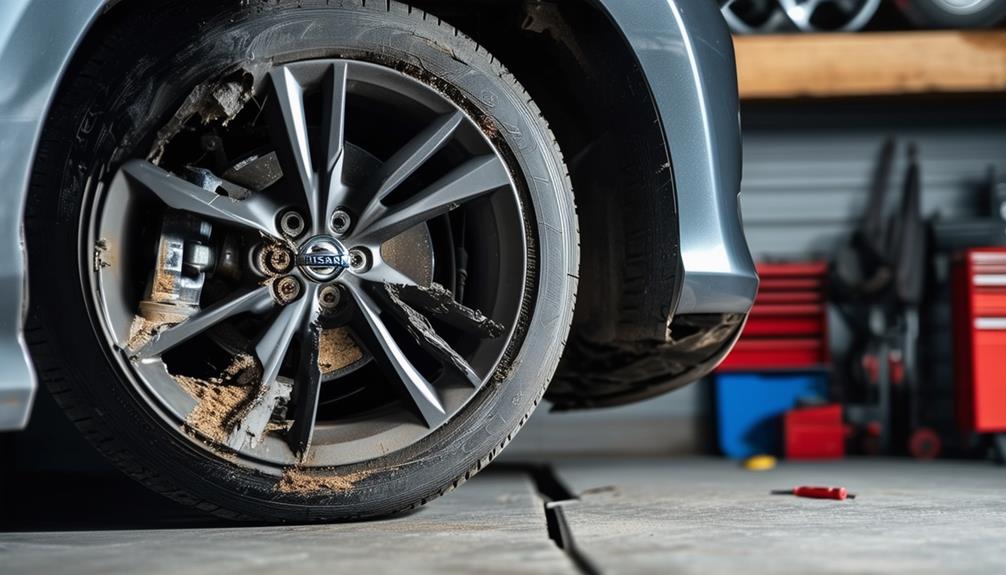
Experiencing issues with your Nissan Altima's suspension and brakes can significantly impact your driving safety and comfort. Addressing these problems is important to guarantee your vehicle handles well and stops efficiently. Let's delve into the common issues and solutions for your Altima's suspension and brake systems.
First, you might notice your Altima's handling feels off. This could be due to worn-out suspension components like struts, shocks, or bushings. Upgrading to high-performance suspension parts can provide significant handling improvements, making your drive smoother and more responsive. Regularly inspect these components and replace them as needed to maintain peak performance. Additionally, enhancing suspension components can also affect the vehicle's key systems and overall security.
Second, brake issues can range from squeaky noises to reduced stopping power. If you experience these symptoms, it might be time for brake upgrades. Consider replacing the brake pads, rotors, and calipers with high-quality aftermarket options designed to enhance performance and longevity. This not only improves braking efficiency but also ensures your vehicle stops safely under various conditions.
Finally, wheel alignment is another important aspect of suspension maintenance. Misaligned wheels can cause uneven tire wear and poor handling. Make sure your wheels are properly aligned to maintain precise steering and extend the life of your tires. Regular alignments, especially after replacing suspension components, are essential for optimal handling improvements.
Key Actions to Take:
- Inspect and Replace Suspension Components: Check struts, shocks, and bushings regularly; upgrade to high-performance parts for better handling.
- Perform Brake Upgrades: Replace brake pads, rotors, and calipers with high-quality aftermarket parts to enhance stopping power.
- Ensure Proper Wheel Alignment: Regular alignments improve steering precision and tire longevity.
Troubleshooting Key Fob Problems
Key fob issues can be a source of frustration, impacting your ability to open, start, or secure your Nissan Altima efficiently. Troubleshooting these problems involves a few critical steps that can save you time and get your car back in action.
First, consider a battery replacement. If the key fob's range has decreased or it no longer works, the battery might be dead. To replace it, open the key fob case using a small flathead screwdriver, carefully remove the old battery, and insert a new CR2032 battery. Confirm it sits correctly in the holder.
If a new battery doesn't solve the problem, you might need to look into remote programming. Sometimes, the key fob can lose synchronization with the car's system. To reprogram it, sit in the driver's seat, close all doors, and insert the key into the ignition. Cycle the ignition from "Off" to "On" six times within 10 seconds, ending in the "On" position. You should then hear a chime, indicating the car is in programming mode. Press any button on the key fob, and wait for the hazard lights to flash twice, confirming successful programming.
Below is a quick reference table for troubleshooting key fob issues:
| Problem | Solution |
|---|---|
| Key fob not working | Battery replacement |
| Key fob range decreased | Battery replacement |
| Key fob not syncing | Remote programming |
| Intermittent key fob issues | Check for interference |
Known Recalls and Faults

Dealing with known recalls and faults in your Nissan Altima is crucial for maintaining its reliability and safety. Over the years, several safety recalls have been issued, targeting various faulty components that could compromise your vehicle's performance. Addressing these issues promptly guarantees that your Altima remains a dependable and secure mode of transportation. Additionally, staying informed about advanced driver assistance technologies can help you better understand how these safety features work to protect you on the road.
Common Recalls and Faults
- Airbag Inflator Recall: One of the most critical safety recalls involved defective airbag inflators. These faulty components could deploy improperly during an accident, posing a severe risk to occupants. Repair solutions typically involve replacing the inflator with a new, more reliable unit. If your Altima falls under this recall, don't delay in getting it fixed to secure that your airbags function correctly when needed.
- Transmission Problems: Some Altima models have experienced issues with their Continuously Variable Transmissions (CVT). Symptoms include jerking, stalling, or even complete transmission failure. The troubleshooting process often reveals wear and tear in the transmission's internal components. Nissan has acknowledged this issue and offers extended warranties or repair solutions to address these faulty components. Making sure your transmission is inspected and serviced can prevent more severe problems down the line.
- Steering Column Fault: Another notable recall involved the steering column, which could potentially fail and cause loss of steering control. This fault is particularly dangerous as it directly impacts your ability to maneuver the vehicle. Repair solutions generally include replacing the defective steering column with an improved version. Checking your vehicle's recall status and addressing this issue promptly can prevent hazardous driving conditions.
Preventative Maintenance Tips
Proper preventive maintenance is vital to keep your Nissan Altima running smoothly and to avoid costly repairs down the road. Start by adhering to your vehicle's maintenance schedule, which can typically be found in the owner's manual. This includes routine oil changes every 5,000 to 7,500 miles, depending on your driving conditions and oil type. Clean oil guarantees that your engine runs efficiently and reduces wear on its components.
Additionally, make sure to inspect the key and security systems, as these are essential inspection areas that can prevent potential issues with starting your vehicle.
Tire rotations are equally important. Rotating your tires every 6,000 to 8,000 miles helps distribute wear evenly, extending their lifespan and improving your Altima's handling. Don't forget to check tire pressure monthly, as well. Properly inflated tires enhance fuel efficiency and provide better traction.
Winterizing your Altima is another key aspect of preventive maintenance, especially if you live in colder climates. Verify your antifreeze levels are adequate and the mixture is correct to prevent your engine from freezing. Additionally, switch to winter-grade oil if recommended, as it flows better at lower temperatures. Inspect your battery, as cold weather can reduce its efficiency, and consider using winter tires for improved grip on icy roads.
Regularly inspect your Altima's brakes. Listen for any unusual noises and feel for any changes in braking performance. Brake fluid should be checked and replaced as necessary, typically every 2 years.
Repair Costs and Options
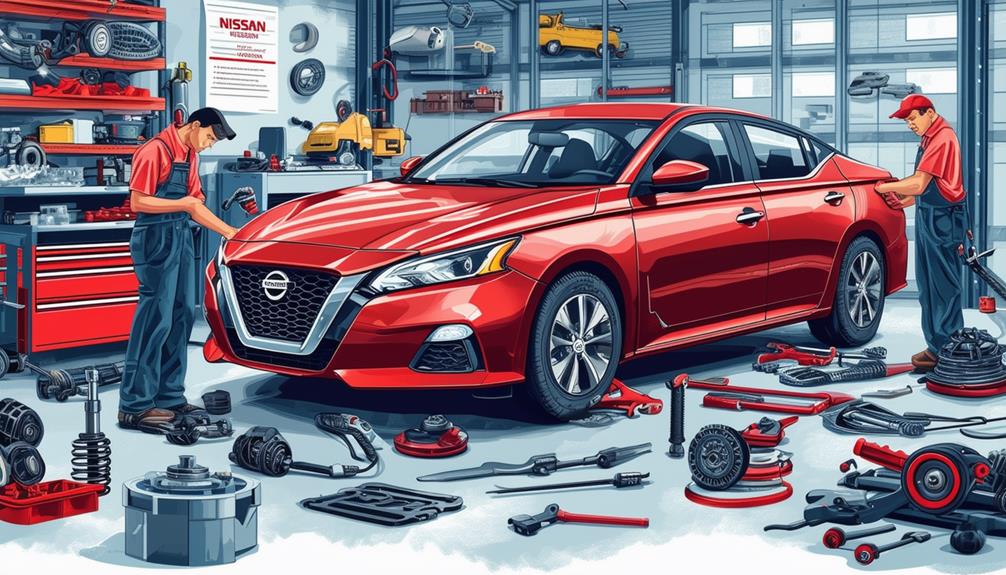
Understanding the repair costs and options for your Nissan Altima can help you make informed decisions and manage your budget effectively. Whether you're dealing with a faulty transmission or a problematic timing chain, knowing your choices can save you time and money. Additionally, if you ever misplace your car keys, remember that automotive locksmiths offer more affordable, quality key replacement options compared to dealerships.
First, consider the repair choices:
1. DIY Fixes: For minor issues such as replacing brake pads or changing the oil, you can opt for DIY fixes. This option is economical but requires some mechanical know-how and the right tools. For example, replacing brake pads yourself can cost around $50–$100 in parts, compared to $150–$300 for professional repairs.
2. Professional Repairs: If the issue is more complex, like a transmission rebuild or timing chain replacement, professional repairs are advisable. Although pricier, they guarantee the job is done correctly.
For instance, a timing chain replacement can cost between $600–$1,000, while a transmission rebuild might set you back $2,000–$4,000.
3. Cost Comparison: Before deciding, perform a cost analysis. Evaluate the price difference between DIY fixes and professional repairs. Factor in not just the money, but also the time and effort required.
Finding Reliable Service Centers
When you've evaluated your repair options and decided on professional assistance, the next step is finding a dependable service center. Start by seeking service recommendations from fellow Nissan Altima owners or automotive forums. These sources often provide valuable insights based on firsthand experiences. Additionally, check if the service center honors your vehicle's warranty coverage, which can save you significant costs on parts and labor.
Next, dig into online reviews to gauge the service center's reputation. Look for consistent feedback regarding their technical expertise, customer service, and problem-solving capabilities. Pay attention to how they handle common Nissan Altima issues, as this can be a strong indicator of their proficiency with your vehicle's specific needs. Additionally, consider whether the service center is adept at handling key systems and comfort features, as these are essential to the Altima's advanced interior technology.
If you're considering DIY solutions for minor repairs, weigh the complexity of the task against your skill level and available tools. For more complex issues, professional intervention is advisable to prevent further damage. However, even if you're skilled at DIY solutions, having a reliable service center for consultation and support can be an important backup.
Innovation-focused drivers should seek service centers that utilize advanced diagnostic tools and up-to-date repair techniques. Centers that invest in continuous training for their technicians are more likely to provide accurate and efficient service. Don't hesitate to ask about their equipment and training programs to make sure you're entrusting your vehicle to capable hands.
Frequently Asked Questions
What Are the Most Common Issues With the Altima's Climate Control System?
You'll often face issues with the Altima's climate control system, specifically the blower motor failing or the AC compressor malfunctioning. Regular maintenance checks can help you identify these problems early and guarantee efficient climate control performance.
How Often Should I Replace the Altima's Cabin Air Filter?
Think of air filter maintenance as breathing clean air versus suffocating pollution. You should replace the Altima's cabin air filter every 15,000 to 20,000 miles. Regular filter replacement guarantees excellent air quality and system efficiency.
Are There Any Common Issues With the Altima's Infotainment System?
You might encounter infotainment glitches in your Altima. Troubleshooting often involves addressing Altima software updates and compatibility issues. Regularly updating the software can help minimize these problems, ensuring smoother operation and enhanced user experience.
What Are the Signs of a Failing Catalytic Converter in an Altima?
Think of your catalytic converter as the lungs of your Altima. If you notice reduced engine performance, rotten egg smells, or illuminated check engine light, it's time for a catalytic converter replacement to solve those Altima emission problems.
How Do I Improve the Fuel Efficiency of My Nissan Altima?
To improve your Nissan Altima's fuel efficiency, follow these maintenance tips: regularly change the air filter, use the correct motor oil, and keep tires properly inflated. Additionally, adopt efficient driving habits like smooth acceleration and consistent speeds.
Conclusion
Wrapping up, it's important to stay on top of your Nissan Altima's maintenance to avoid common issues. Did you know that nearly 20% of Altima owners report transmission problems within the first 100,000 miles? By addressing potential issues early, you can save on costly repairs and guarantee a smoother ride. Don't forget to consult a reliable service center like Low Rate Locksmith Nissan Altima for expert advice and quality repairs. Your car's longevity depends on it.

